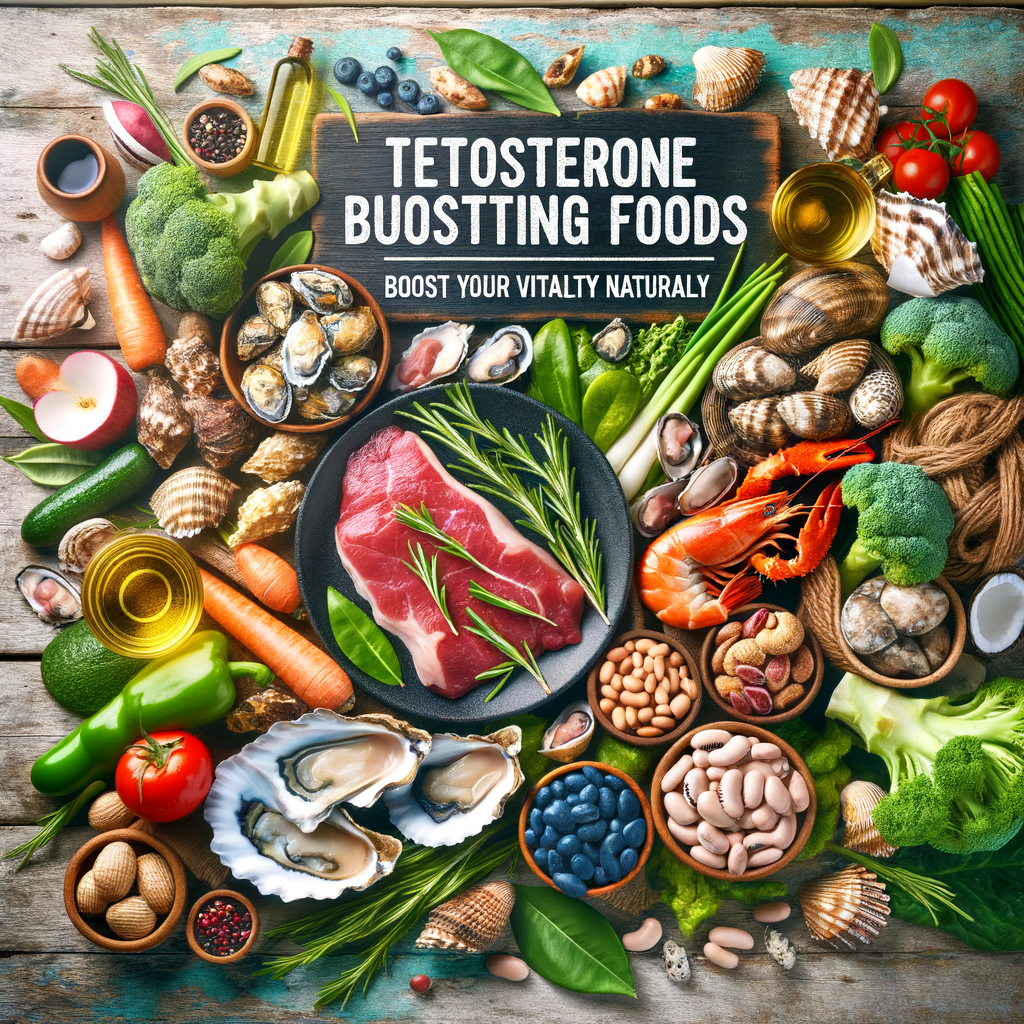- Introduction
- Why Testosterone Matters
- Foods that Boost Testosterone
- 1. Tuna and Other Fatty Fish
- 2. Eggs
- 3. Spinach
- 4. Garlic
- 5. Pomegranates
- 6. Avocados
- 7. Ginger
- 8. Brazil Nuts
- FAQs About Testosterone-Boosting Foods
- 1. Can testosterone levels be increased naturally through diet alone?
- 2. Are there specific foods that can lower testosterone levels?
- 3. How quickly can dietary changes impact testosterone levels?
- 4. Can women benefit from consuming testosterone-boosting foods?
- 5. Are there any side effects of consuming testosterone-boosting foods?
- 6. Can supplements be used in conjunction with testosterone-boosting foods?
- 7. Are there specific cooking methods that can preserve the testosterone-boosting properties of foods?
- 8. Are there any foods that should be consumed in moderation for optimal hormone balance?
- 9. Can lifestyle factors, such as exercise and sleep, enhance the effects of testosterone-boosting foods?
- 10. What other factors besides diet can influence testosterone levels?
- Conclusion
- References
Introduction
Welcome to our guide on testosterone-boosting foods that can naturally revitalize your vitality. Testosterone is a crucial hormone that plays a major role in various aspects of health, including muscle development, bone density, and libido. While many factors can influence testosterone levels, including exercise and sleep, the foods we consume also play a significant role. By incorporating the right foods into your diet, you can support healthy testosterone levels and enhance your overall well-being.
Why Testosterone Matters
Testosterone is often referred to as the primary male sex hormone, but it is essential for both men and women. In men, testosterone is produced in the testes and helps regulate muscle mass, bone density, red blood cell production, and fat distribution. Women produce testosterone in smaller amounts, primarily in the ovaries and adrenal glands, where it contributes to muscle strength and libido. Optimal testosterone levels are crucial for maintaining energy, mood, and overall health.
Foods that Boost Testosterone
1. Tuna and Other Fatty Fish
Fatty fish such as tuna, salmon, and mackerel are rich in omega-3 fatty acids, which are known to help increase testosterone levels. These healthy fats not only support heart health but also aid hormone production. Incorporating fatty fish into your diet is a delicious way to boost your testosterone naturally.
2. Eggs
Eggs are a nutrient-dense food that is packed with protein, vitamins, and minerals. The yolks, in particular, contain cholesterol, which is a precursor to testosterone production. Including eggs in your diet can provide essential nutrients that support overall health and hormone balance.
3. Spinach
Spinach is a powerhouse of nutrients, including magnesium, which has been shown to help increase testosterone levels. Magnesium plays a vital role in muscle function and energy production, making it a valuable addition to your diet. Incorporate spinach into your meals through salads, smoothies, or sautés for a testosterone boost.
4. Garlic
Garlic is not only a flavorful addition to your dishes but also a natural testosterone booster. It contains allicin, a compound known for its potential to increase testosterone levels. Adding garlic to your meals can not only enhance flavor but also support hormonal balance.
5. Pomegranates
Pomegranates are rich in antioxidants, which can help reduce inflammation and improve overall health. Studies have shown that pomegranate juice can increase testosterone levels and boost mood. Enjoying this delicious fruit as a snack or adding it to your smoothies can provide a tasty way to support testosterone production.
6. Avocados
Avocados are a fantastic source of healthy fats, including monounsaturated fats, which support heart health and hormone production. These creamy fruits are also rich in vitamin E, a nutrient that has been linked to increased testosterone levels. Include avocados in salads, spreads, or smoothies to reap their testosterone-boosting benefits.
7. Ginger
Ginger is a flavorful spice that has been used for its medicinal properties for centuries. Studies have shown that ginger may help increase testosterone levels and improve sperm quality. Adding ginger to your meals, teas, or smoothies can not only enhance flavor but also support hormonal health.
8. Brazil Nuts
Brazil nuts are a great source of selenium, a mineral that plays a crucial role in hormone production, including testosterone. Incorporating Brazil nuts into your diet can help support optimal testosterone levels and overall health. Enjoy them as a snack or add them to your favorite dishes for a nutritious boost.
FAQs About Testosterone-Boosting Foods
1. Can testosterone levels be increased naturally through diet alone?
Yes, incorporating testosterone-boosting foods into your diet can help support healthy testosterone levels. However, it is also essential to maintain a balanced diet, exercise regularly, and manage stress to optimize hormone production.
2. Are there specific foods that can lower testosterone levels?
Certain foods, such as processed foods high in refined sugars and unhealthy fats, may contribute to lower testosterone levels. It is important to focus on whole, nutrient-dense foods to support hormone balance.
3. How quickly can dietary changes impact testosterone levels?
While individual responses may vary, making dietary changes can have a relatively quick impact on testosterone levels. Consistent consumption of testosterone-boosting foods over time can help support hormone production and balance.
4. Can women benefit from consuming testosterone-boosting foods?
Yes, women can also benefit from incorporating testosterone-boosting foods into their diet. These foods provide essential nutrients that support overall health, including muscle strength, energy levels, and hormone balance.
5. Are there any side effects of consuming testosterone-boosting foods?
As long as testosterone-boosting foods are consumed as part of a balanced diet, they are generally safe and beneficial for health. However, it is always important to consult a healthcare provider before making significant dietary changes.
6. Can supplements be used in conjunction with testosterone-boosting foods?
While some individuals may choose to supplement their diet with vitamins or minerals, it is important to prioritize a nutrient-dense diet first. Testosterone-boosting foods should be the foundation of hormonal health before considering supplements.
7. Are there specific cooking methods that can preserve the testosterone-boosting properties of foods?
Cooking methods such as steaming, sautéing, or grilling can help preserve the nutrients in testosterone-boosting foods. Avoiding overcooking or excessive processing can retain the beneficial properties of these foods.
8. Are there any foods that should be consumed in moderation for optimal hormone balance?
While testosterone-boosting foods are generally beneficial, it is important to consume them as part of a balanced diet. Foods high in saturated fats or processed sugars should be consumed in moderation to support overall hormone balance.
9. Can lifestyle factors, such as exercise and sleep, enhance the effects of testosterone-boosting foods?
Yes, incorporating regular exercise and prioritizing quality sleep can help optimize the effects of testosterone-boosting foods. A healthy lifestyle that includes physical activity and adequate rest can support hormonal balance and overall well-being.
10. What other factors besides diet can influence testosterone levels?
In addition to diet, factors such as stress, sleep quality, exercise, and overall health can influence testosterone levels. It is important to prioritize a holistic approach to health that includes various lifestyle factors to support optimal hormone production.
Conclusion
Incorporating testosterone-boosting foods into your diet is a simple and effective way to support healthy testosterone levels and enhance your vitality naturally. By including nutrient-dense foods like fatty fish, eggs, spinach, garlic, pomegranates, avocados, ginger, and Brazil nuts, you can provide your body with the essential nutrients it needs for optimal hormone production. Remember to focus on a balanced diet, regular exercise, quality sleep, and stress management for comprehensive hormone support. Boost your vitality with these delicious and nutritious foods that promote overall health and well-being.
References
– Harvard Health Publishing. (2021). Testosterone–what it does and doesn’t do. Harvard Health. Link
– MedlinePlus. (2021). Testosterone. U.S. National Library of Medicine. Link
– Mayo Clinic. (2021). Testosterone: What it does and how it affects male health. Mayo Clinic. Link



